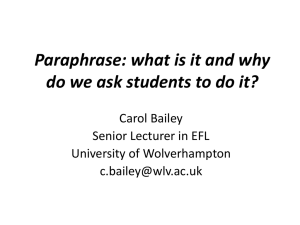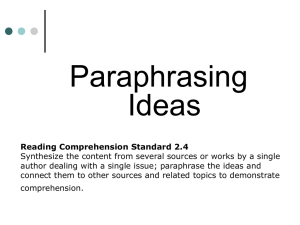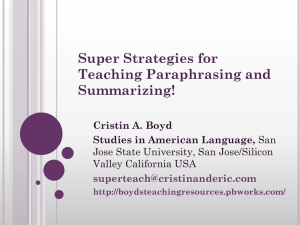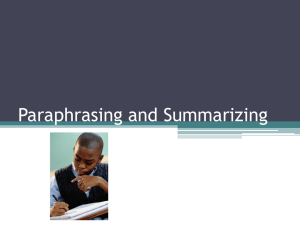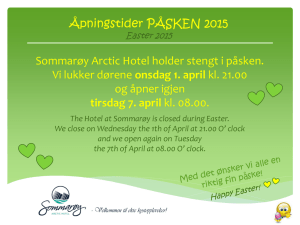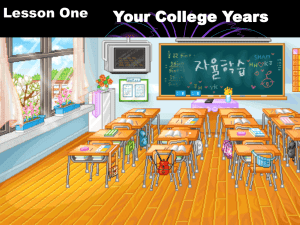ParaQuotSumm - University of Bradford
advertisement
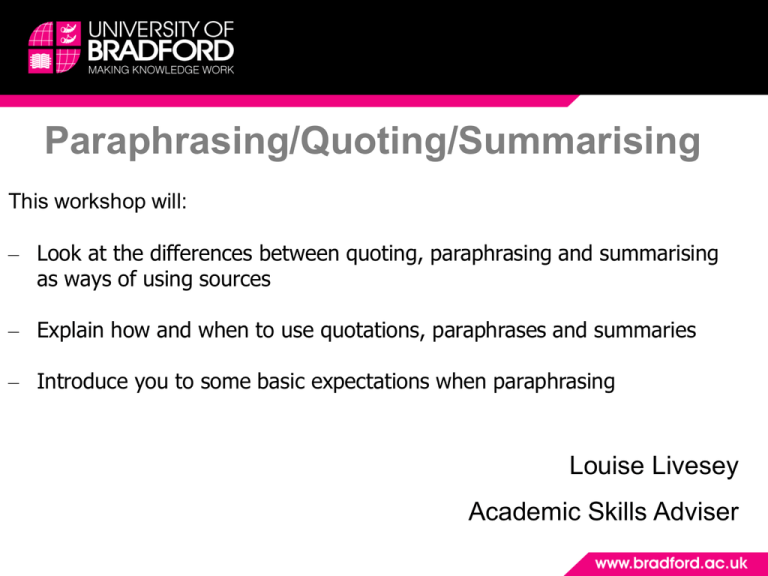
Paraphrasing/Quoting/Summarising This workshop will: – Look at the differences between quoting, paraphrasing and summarising as ways of using sources – Explain how and when to use quotations, paraphrases and summaries – Introduce you to some basic expectations when paraphrasing Louise Livesey Academic Skills Adviser Today’s plan 1.What sources can and cannot do 2.What quotes, paraphrases and summaries are 3.When to use quotations, paraphrases and summaries 4.Focus on paraphrasing What sources can and cannot do Source material cannot make your points for you: back up your points or provides material for you to argue against. Choose information that relates to or supports your points. Always be faithful to the meaning of the source material. Cite appropriately: not doing so could lead to allegations of plagiarism. 2.What quotes, paraphrases and summaries are A. A quote is the exact wording of the source material B. A paraphrase is a detailed restatement in your own words of source material. Apart from the changes in organization, wording, and sentence structure, the paraphrase should be nearly identical in meaning to the original passage. It should also be near the same length as the original passage and present the details of the original. C. A summary is a condensed version of a passage. Similar to paraphrasing, summarizing involves using your own words to express another author's ideas. Unlike the paraphrase, which presents important details, the summary presents only the most important ideas of the passage. 2.What quotes, paraphrases and summaries are A quote According to Roger Sipher, a solution to the perceived crisis of American education is to ‘abolish compulsory-attendance laws and allow only those who are committed to getting an education to attend’ (31). A paraphrase Roger Sipher concludes his essay by insisting that schools have failed to fulfil their primary duty of education because they try to fill multiple social functions. A summary Roger Sipher makes his case for getting rid of compulsory-attendance laws in primary and secondary schools with six arguments. These fall into three groups—first that education is for those who want to learn and by including those that do not want to learn, everyone suffers. Second, that grades would be reflective of effort and elementary school teachers would not feel compelled to pass failing students. Third, that schools would both save money and save face with the elimination of compulsory-attendance laws. 3.When to use quotations, paraphrasing and summarising Use when… Q Specific words are crucial to your point * Making a very specific point, especially about an individual/their views * Analysing/challenging a view expressed in a quote * Need strong support/authority to your point * Adding impact to an introduction/conclusion * P S The wording of the source is less important than the meaning of the source * * Changing of ideas for emphasis but remaining faithful to the meaning of the source * Simplifying complex arguments, sentences or vocabulary * Clarifying technical passages or specialized information * * Providing a brief overview of a text, e.g. a book, in one sentence, or in several paragraphs, depending on your writing situation and audience * Condensing the material to draw out the points that relate to your work * Omitting extra information from the source material to focus on the author’s main point/s * 4.Focus on paraphrasing Quotation: ‘Schools should be for education. At present, they are only tangentially so. They have attempted to serve an allencompassing social function, trying to be all things to all people. In the process they have failed miserably at what they were originally formed to accomplish.’ Paraphrase: Roger Sipher concludes his essay by insisting that schools have failed to fulfil their primary duty of education because they try to fill multiple social functions. 4.Focus on paraphrasing A paraphrase is a detailed restatement in your own words of a written (or sometimes spoken) source material. This paraphrase includes the necessary details of what schools should be for education (‘should be’ ‘primary duty’) and why schools are failing (‘try to fill multiple social functions’ ‘all things to all people’). In addition, it uses the writer’s own words throughout (‘primary duty’ and ‘multiple social functions’). 4.Focus on paraphrasing Apart from the changes in organization, wording, and sentence structure, the paraphrase should be nearly identical in meaning to the original passage. The paraphrase has rearranged the organization of the information provided from… what schools ‘should be’ then ‘all things to all people’ then failure to… failure then what schools duties are then functions The wording has changed, and the structure has also been altered from multiple sentences to one complex sentence. The two texts are almost interchangeable where meaning is concerned. 4.Focus on paraphrasing The paraphrase should also be near the same length as the original passage and present the details of the original. The paraphrase is unusually somewhat shorter in length than the original but does include its details relating to those elements already discussed. 4.Focus on paraphrasing Hong Kong’s Polytechnic University has constructed Hotel ICON, a luxury 262-bedroom hotel with three restaurants that was built for its School of Hotel and Tourism Management at a cost of HK$800 million (£60 million). Opened in 2011, the hotel integrates teaching, learning and research in a ‘full-service environment’. Courses that make use of it include a PhD in hotel and tourism management and an executive master’s in global hospitality and leadership. The same school also contains the ‘Vinoteca Lab’, where students learn everything from the skilful pairing of food and wine to the history and culture of the wine industry. Meanwhile, Bistro 1979, which can seat 66 diners, allows students to hone their hospitality skills in a working restaurant. All these premises are owned by Hong Kong Polytechnic University (or PolyU, as it is known). In recent years, Hong Kong Polytechnic University has invested to the tune of tens of millions of pounds in facilities and projects, including a new 262-bedded hotel, within its School of Hotel and Tourism Management. The new buildings provide a range of teaching environments for course levels up to and including doctorates where students learn the theory and practical elements of their chosen profession. Summary: it is a lot shorter with writer’s own word used and key points are covered 4.Focus on paraphrasing Hong Kong’s Polytechnic University has constructed Hotel ICON, a luxury 262-bedroom hotel with three restaurants that was built for its School of Hotel and Tourism Management at a cost of HK$800 million (£60 million). Opened in 2011, the hotel integrates teaching, learning and research in a ‘full-service environment’. Courses that make use of it include a PhD in hotel and tourism management and an executive master’s in global hospitality and leadership. The same school also contains the ‘Vinoteca Lab’, where students learn everything from the skilful pairing of food and wine to the history and culture of the wine industry. Meanwhile, Bistro 1979, which can seat 66 diners, allows students to hone their hospitality skills in a working restaurant. All these premises are owned by Hong Kong Polytechnic University (or PolyU, as it is known). The School of Hotel and Tourism Management of Hong Kong Polytechnic University, or PolyU, has recently invested heavily in a number of major projects. One of these helps students gain skills and knowledge in matching wine with food, amongst other elements of the wine world , at the ‘Vinoteca Lab’. In another, students learn key practical front-of-house skills in a large restaurant seating 66 people - Bistro 1979. In yet a third, launched in 2011 with a construction cost of £60 million, students from under-graduate to doctoral level courses attend classes at the fully-functional 262-bedded Hotel ICON: a most unusual place to study and research. Paraphrase: similar length with same detail as original. Meaning is also nearly identical with organization, wording and structure of sentences changes. 4.Focus on paraphrasing Activity 1: Scientists do not agree about the extent to which creativity can be linked to activity in the right hemisphere of the brain. It is known that the biochemistry of the two hemispheres of the brain is different. Paraphrase: Hemispheric differences within the brain do not have consensus in the scientific community, for instance the association between the right hemisphere and creativity has been debated (Cottrell, 2013). 4.Focus on paraphrasing Activity 1: In the past, opponents of immigration raised economic, racial, religious, and nationalistic objections or questions about large-scale immigration to the United States (Jones, 2006: 247-305). Today, however, experts tell us that opposition to immigration is expressed almost exclusively in economic terms. For example, Dan Lacy, a workplace consultant, business journalist, and editor, found that "research of immigration attitudes" shows that the fear that some Americans have of losing their jobs to immigrants is the main reason for opposition to immigration today (Smith, 1998: 41). Paraphrase: Previously, those against immigration were able to articulation several negative factors to support their views of mass migration. This may no longer be the case: only economics, specifically concerned about a lack of employment, appear to be stipulated (Warwick, 2011). References Cottrell, S. (2013) The Study Skills Handbook. 4th ed. Basingstoke: Palgrave Macmillan Ltd. DiCataldo, F. and Everett, M. (2008) Distinguishing juvenile homicide from violent juvenile offending. In Shon, P.C.H. (2012) How to Read Journal Articles in the Social Sciences. (2426). London: Sage Publications Ltd. Parr, C. (2014) To Make Our World Anew. Times Higher Education. Vol. 2 Issue 161: pp 3239. Sipher, R. (1977) So That Nobody Has to Go to School If They Don't Want To. The New York Times. 19.12.1977. p. 31. [online] Available at: https://owl.english.purdue.edu/owl/resource/563/03/ [Accessed 18.9.2014] University of Houston-Victoria. (2014) Decide when to Quote, Paraphrase & Summarize. Victoria: University of Houston-Victoria. [online] Available at: http://www.uhv.edu/StudentSuccessCenter/style/quote.aspx [Accessed 14.8.2014] Warwick, C. (2011) Help…I've Been Asked to Synthesize! Bowling Green: Bowling Green State University. [online] Available at: http://www2.bgsu.edu/downloads/enrollment/file108384.pdf [Accessed 16.9.2014] Academic Skills Advice Service • Where are we? Chesham Building B0.23 • What do we do? Support undergraduate students with their study skills by running clinics and workshops, having bookable appointment slots, and enabling students to drop-in for Instant Advice. • Who are we? Michael and Helen specialise in Maths Support; Lucy and Russell advise students on study skills; and I (Louise) deliver the workshops • When can you come for help? Everyday both face to face and on-line • How do I get in touch? Email: academicskills@brad.ac.uk or website www.brad.ac.uk/academicskills Any questions?
